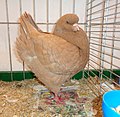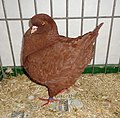 A pair of white Kings | |
| Conservation status | Common |
|---|---|
| Country of origin | United States |
| Classification | |
| Australian Breed Group | Utility Group9 |
| US Breed Group | Utility |
| EE Breed Group | Hen Pigeons |
| |
The King pigeon is a breed of pigeon developed over many years of selective breeding primarily as a utility breed. [1] Kings along with other varieties of domesticated pigeons are all descendants from the rock dove (Columba livia).
Contents
The breed is known for its large size and suitability for squab production.






